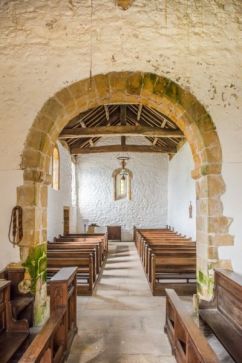
Why we need Lent…a sermon for Adel Parish Church, forst Sunday of Lent 2023.
Genesis 2: 15 – 15, 3: 1 – 7 Matthew 4: 1 – 11
There are two sausages in a frying pan. One says to the other, ‘Gosh it’s hot in here’…the other one says, ‘blimey, a talking sausage’!
Well, it made me laugh…it underlines the absurdity of jokes…they’re only funny because we enter their alternative world. I think this morning’s Old Testament reading demands something similar. Since the most logical response might be, ‘blimey a talking snake’…I suspect it was never meant to be taken literally.
The story is a sophisticated exploration of how we, who are created in God’s image, can wander so far from him; how despite our good intentions – we so often end up doing wrong. It’s about the importance of both freedom and boundaries for human flourishing.
The writers of Genesis knew from experience how prone humans are to making wrong choices. And like every society in history, they knew certain choices must be forbidden to allow humans to flourish. God gave Adam and Eve a glorious world to explore, care for and use. But he also gave them limits…they were forbidden to eat of the ‘tree of knowledge of good and evil’.
They were forbidden – but not prevented. God created us to have a relationship with him, offering unconditional love. But it’s not love if it’s forced on us; a genuine loving relationship means we have to have the option to refuse. The story explores how God gives Adam and Eve the power to make choices…and the results of this.
This story, especially the serpent, have become so linked with evil that it’s worth noting both the snake, and the forbidden tree are part of God’s good creation.
And the snake doesn’t invite Eve to do something terrible…it’s more a suggestion that Adam and Eve know better than God what’s good for them; that God wants to keep them in their place.
It’s hard to know exactly what’s meant by the ‘tree of knowledge of good and evil’, but the snake suggests eating its fruit will make them ‘like God’. Perhaps this story is about the temptation to make ourselves the judge of what’s good and what’s evil…to put ourselves in place of God.
It’s a more sophisticated view of sin than a list of rules. For us – law abiding I’m sure – it’s probably a more useful description of what goes wrong in our lives and separates us from God. Sin’s not usually dramatic wrongdoing, it’s giving in to the serpent’s voice that tempts us to trust in ourselves rather than God.
Today’s lectionary also gives us the temptation of Jesus. He was better than us at resisting; but he was human…so to some extent his temptations are also ours.
Again – they’re not about obvious evil – they’re much more subtle. Jesus is led into the wilderness…he’s weak and hungry…he’s tempted to believe God doesn’t really care…can’t be trusted. He’s God’s son, why not give up on God…make his own bread?
We’re often tempted not to trust God. But trusting God can’t mean just waiting for God to act. We pray for people in Syria and Turkey – surely we must help in practical ways too? How do we know if we’re failing to trust God, or acting in his name? Jesus suggests we look for guidance in God’s word…start from God.
Ok, says the devil, if it’s about trusting God, then make it grand. ‘Throw yourself off this high tower…God will have to act…and it’ll be so impressive people will believe in God’…surely a win/win?
Again, it’s a subtle temptation…’don’t put God to the test’, says Jesus. Don’t say, ‘I’ll believe in you if…’; or, ‘do this miracle for me, and others will believe’.
But Jesus also said ‘heal the sick’, ‘with faith enough you can move mountains’. Perhaps it’s about trusting that God can do amazing things – but not trying to force God’s hand, make ourselves look good. Trying to discern God’s will for the world…starting from God.
When Jesus can’t be diverted from his task of building God’s kingdom – the tempter becomes even cleverer. ‘Worship me and I’ll help you with your task’, says the devil…I can give you armies and weapons.
How often are we tempted to think the end justifies the means? We’re struggling a bit with church finances – let’s cut what we give to charity. We’re anxious about immigration levels, let’s ignore the use of hateful, inflammatory language about refugees.
Jesus’ response is – don’t worship anything but God…not power, not money, not a ‘strong leader’…whatever your reasons. Start from God.
Not trusting God; being motivated by our own ego; being seduced into wrong words or actions hoping they’ll result in something good. Sins not always easy to spot…which is why we need the discipline of Lent, a reminder that we’re human, we will turn from following Christ, a reminder to work at ‘starting from God’.
But how? Is there any point in the traditional ‘giving up’, of alcohol, sweets, coffee?
This Lent I’ve given up sweets and social media (except updating the church Facebook page). Trivial in a way – neither are evil in themselves…but they are things I crave. So they’re a reminder of the more subtle things that waylay me as I try to follow Christ. And with the reminder in mind, I’ll also try to spend more time in prayer…root my life more securely in God.
Jesus’ time of temptation helped him work out what being God’s human son meant…relying on God in total obedience and love. It meant there was no easy way. Refusing to throw himself off a tower armed him for when they said, ‘if you’re the son of God, come down from the cross.’
We need Lent so we’re ready to follow Jesus even when it means taking the more difficult path. Lent can seem like a long slog – but the joy is that the end does justify the means. As Christ’s disciples we need to prepare for Good Friday…it can’t be avoided – but we do so in the hope that the way through Good Friday leads to Easter Sunday.

